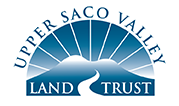
Land Acknowledgment Statement
Land acknowledgment has been a traditional practice in certain Indigenous communities for many centuries. In recent years, as the spotlight on diversity, equity and inclusion work has grown brighter, non-Indigenous organizations of many stripes have begun to put forth their own land acknowledgments, as an important way of honoring the Indigenous peoples who originally stewarded the lands on which we work and live. Below is the USVLT’s land acknowledgment, adopted by the Board on April 19, 2021.
As a conservation organization with a mission to preserve land for community benefit, the Upper Saco Valley Land Trust has a responsibility to acknowledge that the portion of New Hampshire and Maine in which we operate is the unceded ancestral homeland of the Wabanaki (meaning “People of the Dawn”), including the Pequawket, Ossipee, and Abenaki. The sacred relationship of the Wabanaki to this land and these waters stretches beyond time immemorial, more than 12,000 years.
Over the past 500 years, white European colonists displaced, dispossessed, and killed many of this region’s Indigenous people through settlement, disease, conflict, and political mistreatment. Much of the Wabanaki’s rich history, culture, accumulated wisdom and environmental knowledge has been erased.
The Upper Saco Valley Land Trust’s conservation work is embedded in a system of land acquisition and ownership that resulted from European colonization. It is therefore our responsibility to acknowledge this history and its ongoing effects, and to try to reconcile the injustices of the past with our mission to conserve land for the benefit of everyone in our community. We pledge to educate ourselves and our community about our region’s history, and to build mutual relationships with Indigenous community members that honor, recognize, and help restore a connection to these lands.
